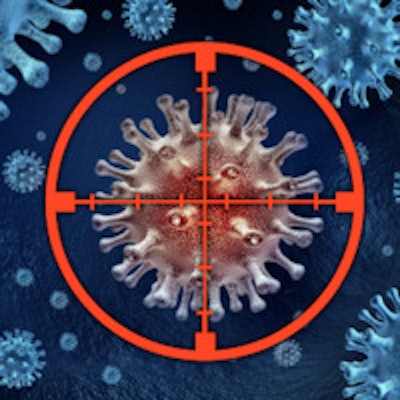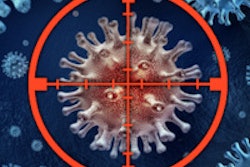
A new immunotherapy drug was found to be almost twice as effective as the preferred treatment for decreasing the size of tumors of patients with recurrent or metastatic head and neck cancer (HNC), according to a study presented at the recent meeting of the American Society for Clinical Oncology (ASCO).
 Pembrolizumab. All images courtesy of University of Chicago Medical Center.
Pembrolizumab. All images courtesy of University of Chicago Medical Center.Immunotherapy with pembrolizumab (MK3475) reduced the size of tumors in 56% of patients overall, making it more effective than platinum-based chemotherapy plus cetuximab (an epidermal growth factor inhibitor), the current preferred treatment, according to the researchers. The drug decreased the size of patients' tumors by at least 30% in almost 25% of the group, they reported.
Only 10% to 13% of patients respond to cetuximab as a single agent, according to the researchers, and recent data indicate that the efficacy in human papilloma (HPV)-positive tumors may differ from HPV-negative tumors. Chemotherapy can be effective, but it also causes significant side effects, such as hair loss, nausea and vomiting, and increased risk of infection because of lowered immunity.
 Tanguy Seiwert, MD.
Tanguy Seiwert, MD.The research findings indicate that pembrolizumab, a checkpoint blocker, may address a large need for better HNC treatments.
"Immunotherapy has been very well tolerated by our patients, and serious side effects have been quite uncommon," lead study author, Tanguy Seiwert, MD, an assistant professor of medicine and the associate program leader for head and neck cancer at the University of Chicago, stated in a release. "This may have the potential to prolong survival for a large proportion of our patients. The efficacy was remarkable, roughly twice as good as any drug combination in our arsenal."
Similar levels of activity
In this study, 132 patients with recurrent or metastatic squamous cell carcinoma of the head and neck received a 200-mg infusion of pembrolizumab every three weeks. The objective response rate was 24.8% (26.3% in HPV-negative patients; 20.6% in HPV-positive patients).
“The efficacy was remarkable, roughly twice as good as any drug combination in our arsenal.”
According to Cancerguide.org, an objective response means either a partial or complete response to a treatment.
The drug showed similar levels of activity in both HPV-associated and HPV-negative tumors compared with epidermal growth factor receptor inhibitors, which appear to be less effective in HPV-positive tumors.
"There was a question whether the response to pembrolizumab was related to HPV status, but we saw responses in both HPV-positive and HPV-negative tumors, so it showed that the drug is more immunogenic," Lynn Schuchter, MD, a C. Willard Robinson Professor of Hematology-Oncology at the University of Pennsylvania, told DrBicuspid.com.
Less than 10% of patients had serious side effects with pembrolizumab; the study found the most common were fatigue, rash, and pruritus. More serious immune-related side effects, such as grade 3 pneumonitis and colitis, were seen in a three patients.
Unlike a report presented at last year's ASCO meeting, the current patient cohort was not selected for PD-L1 expression (a candidate predictive biomarker). Some 59% of the patients enrolled had already received two or more lines of prior therapy, according to the researchers.
"We hope this approach will change the way we treat head and neck cancer," Dr. Seiwert stated. "Our 25% response rate may underestimate the benefit in patients. We know from other disease entities such as lung cancer -- where the experience with immunotherapy is broader -- that patients who have disease stabilization or even pseudoprogression may benefit in ways that translate into longer survival."
In a related study presented at ASCO, Dr. Seiwert and colleagues reported that an experimental test -- applied to an earlier cohort of HNC patients treated with pembrolizumab -- could predict which patients were not likely to benefit from PD-1/PD-L1 agents, with a negative predictive value of 95%.
Two ongoing phase III studies are evaluating pembrolizumab versus standard treatment in patients with recurrent/metastatic HNC. Additional phase III studies with nivolumab (another anti-PD-1 antibody) and MEDI4736 (an anti-PD-L1 antibody) are underway for HNC.
"This assay is quick and reproducible," Dr. Seiwert stated. "The high negative predictive value may help us select out patients who may not benefit from immunotherapy."


















